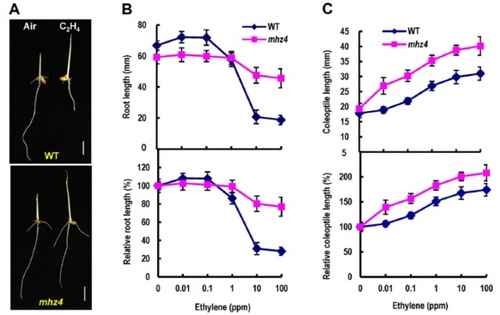
Ethylene Regulates Root Growth Through ABA Pathway in Rice
Oct 24, 2014 Email"> PrintText Size

Ethylene signaling pathway has been established in model dicotyledonous plant Arabidopsis. However, its roles and features of signal transduction in monocotyledous plants remain largely unknown.
In a recent research, Prof. ZHANG Jinsong’s group and Prof. CHEN Shouyi’s group, both from the Institute of Genetics and Developmental Biology of Chinese Academy of Sciences, reported a novel mechanism of the interplay between ethylene signaling and abscisic acid (ABA) signaling in monocotyledonous plant rice.
The researchers characterized a rice mutant mhz4, which exhibited reduced ethylene response in the root but enhanced ethylene response in the coleoptile of etiolated seedlings (Figure 1). They found that MHZ4 encoded a chloroplast-localized membrane protein homologous to Arabidopsis ABA4, which was responsible for ABA biosynthesis. MHZ4 mutation resulted in ABA deficiency that was proved to be the direct cause of its aberrant ethylene response phenotype. In rice root, MHZ4-dependent ABA pathway genetically acted downstream of ethylene receptors. Ethylene treatment promoted root-specific accumulation of ABA via transcriptional stimulating MHZ4, indicating that ethylene-induced root inhibition in rice was largely mediated through MHZ4-dependent ABA pathway.
This finding is different from that from Arabidopsis, where ethylene-mediated root inhibition is independent of ABA function. In rice coleoptile, MHZ4-dependent ABA pathway functions upstream of ethylene signaling pathway and negatively regulates coleoptile ethylene response at least via transcriptional suppression of OsEIN2.
This work revealed a novel mode of ethylene-ABA interaction which provides new insights in understanding the regulatory mechanisms of ethylene in plant growth and development of monocotyledous crops.
This work has been published online on Oct 16, 2014, in PLoS Genet (doi:10.1371/journal.pgen.1004701). The study is supported by National Natural Science Foundation of China, National Key Basic Research Project and National Transgenic Research Project.
 Figure 1: Ethylene response of etiolated rice seedlings from the WT and mhz4 mutant: (a) Ethylene-response phenotype of the WT and mhz4 mutant seedlings. (b) Ethylene dose response of roots in WT and mhz4 etiolated seedlings. (c) Ethylene dose response of coleoptiles in WT and mhz4 etiolated seedlings. (Image by IGDB)
Figure 1: Ethylene response of etiolated rice seedlings from the WT and mhz4 mutant: (a) Ethylene-response phenotype of the WT and mhz4 mutant seedlings. (b) Ethylene dose response of roots in WT and mhz4 etiolated seedlings. (c) Ethylene dose response of coleoptiles in WT and mhz4 etiolated seedlings. (Image by IGDB)
Ethylene signaling pathway has been established in model dicotyledonous plant Arabidopsis. However, its roles and features of signal transduction in monocotyledous plants remain largely unknown.
In a recent research, Prof. ZHANG Jinsong’s group and Prof. CHEN Shouyi’s group, both from the Institute of Genetics and Developmental Biology of Chinese Academy of Sciences, reported a novel mechanism of the interplay between ethylene signaling and abscisic acid (ABA) signaling in monocotyledonous plant rice.
The researchers characterized a rice mutant mhz4, which exhibited reduced ethylene response in the root but enhanced ethylene response in the coleoptile of etiolated seedlings (Figure 1). They found that MHZ4 encoded a chloroplast-localized membrane protein homologous to Arabidopsis ABA4, which was responsible for ABA biosynthesis. MHZ4 mutation resulted in ABA deficiency that was proved to be the direct cause of its aberrant ethylene response phenotype. In rice root, MHZ4-dependent ABA pathway genetically acted downstream of ethylene receptors. Ethylene treatment promoted root-specific accumulation of ABA via transcriptional stimulating MHZ4, indicating that ethylene-induced root inhibition in rice was largely mediated through MHZ4-dependent ABA pathway.
This finding is different from that from Arabidopsis, where ethylene-mediated root inhibition is independent of ABA function. In rice coleoptile, MHZ4-dependent ABA pathway functions upstream of ethylene signaling pathway and negatively regulates coleoptile ethylene response at least via transcriptional suppression of OsEIN2.
This work revealed a novel mode of ethylene-ABA interaction which provides new insights in understanding the regulatory mechanisms of ethylene in plant growth and development of monocotyledous crops.
This work has been published online on Oct 16, 2014, in PLoS Genet (doi:10.1371/journal.pgen.1004701). The study is supported by National Natural Science Foundation of China, National Key Basic Research Project and National Transgenic Research Project.

CAS Institutes
There are 124 Institutions directly under the CAS by the end of 2012, with 104 research institutes, five universities & supporting organizations, 12 management organizations that consist of the headquarters and branches, and three other units. Moreover, there are 25 legal entities affiliated and 22 CAS invested holding enterprisesThere are 124 I...>> more
Contact Us

Chinese Academy of Sciences
Add: 52 Sanlihe Rd., Xicheng District, Beijing, China
Postcode: 100864
Tel: 86-10-68597592 (day) 86-10-68597289 (night)
Fax: 86-10-68511095 (day) 86-10-68512458 (night)
E-mail: cas_en@cas.cn

